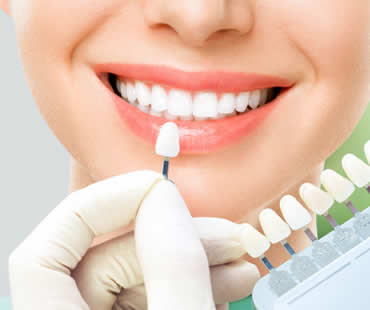
Mar 7, 2024 | Blog, Cosmetic Dentistry, Dental Topics 3
Not everyone has the advantage of a perfect smile. A smile makeover can help you transform your look into what you’d like it to be, and it doesn’t have to take a long time. You can walk away from just one appointment with a better smile. Here are some of the fast treatments using non-invasive techniques that are available.
Whitening teeth
If you’re considering making over your smile, one of the quickest and simplest places to start is teeth whitening. In as little as one hour in a professional setting, you can transform your look by brightening your smile more effectively than trying it at home. Whitening products sold for home use are not as strong as professional methods, so it takes a longer period of consistent use to brighten your teeth only a shade or two. Professional whitening uses stronger concentrations of bleaching agents and a special light to hasten the process, and achieves dramatic results.
Removing white spots
Unsightly white spots that you might see on your teeth are signs of demineralization under your tooth enamel. A smile makeover can include using resin infiltration, which is a non-invasive procedure that can effectively treat white spots. You can say goodbye to the spots in as little as thirty minutes of treatment time. Teeth whitening is not advised, as it can make white spots even more noticeable.
Reshaping teeth
Minor flaws like chipped, cracked, or misshapen teeth can be corrected with contouring. Small areas of your teeth can be shaved or tooth-colored resin can be applied to alter the length or shape of teeth. Tooth contouring can take as little as a half hour, and is great for those with healthy teeth that just need slight alterations for appearance purposes.
Repairing chips or gaps
Dental bonding is a simple procedure that hides gaps, chips, stains, or spacing problems. Tooth-colored resin is sculpted onto the tooth to provide a more appealing smile in only about an hour.
Do you live in Bingham Farms or the surrounding area? Our team is ready to help you achieve your smile goals. Schedule your appointment today.

Feb 29, 2024 | Blog, Dental Topics 3, Family Dentistry
Life isn’t getting any slower, in fact, it seems that it’s always speeding up! This is never truer than it is for families, especially those with two or more children. Parents can feel like the local taxi service, running one child to band and another to piano and yet another to a doctor’s appointment. Finally, there’s a solution to one of the trickier issues: visiting the dentist.
In the past, parents would go to one dentist and the children would go to another. Those same children would later age out of their pediatric dentist and have to form a new relationship with a dentist who doesn’t know them at all! For young people just beginning to take responsibility for their own dental care, this can be the beginning of spotty or not-at-all visits to the dentist for checkups and cleanings. This can be the beginning of poor oral hygiene that leads to scores of adult problems.
A family dentist wants you to skip all that running around and to have your kids avoid the step of finding a new dentist. A family dentist wants to see your entire family, from the youngest baby cutting teeth to the oldest retiree looking at options for aging teeth. This type of relationship is so important. The family dentist will know the patient’s history going years and years back, and can make the best and most informed decisions based on this information.
Your family dentist will also make your family appointments in blocks. Can you imagine having each member of your family – including you – getting your checkups, cleanings and dental care done in the same day, sometimes at the very same time? This is a possibility with the convenience of a trusted family dentist.
If you’re looking to save time and to have the best possible dental care you can get for you and your family, seek out a skilled family dentist today. You won’t regret it!
Ready to transform your smile? Schedule your appointment today at our Bingham Farms dental office.

Feb 22, 2024 | Blog, Cosmetic Dentistry, Dental Topics 3
A gorgeous, white smile conveys confidence and vitality. Age, certain foods, dark beverages, and even medication can dull your teeth. In recent years, teeth whitening has become one of the most popular cosmetic dental procedures. Safe and effective, professional teeth whitening can revitalize your smile. If you are considering brightening your pearly whites, several options are available, including:
In-Office Whitening – Imagine visiting the dentist at lunch time and leaving with a sensational smile. With in-office whitening, you can erase stains and lighten teeth up to 10 shades in about an hour. The down sides to the in-office method are the cost, more than other options, and the lack of control over results. Because the dentist will combine bleaching gel with a special light, you can’t really select a desired shade and get that exact color. However, your bright, white smile will dazzle family and friends.
Take-Home Kits – Some people want to whiten their teeth at home and on their own time tables. Take-home kits allow you to do just that. First, your dentist will take impressions of your teeth and send them to a dental lab to create custom trays. Simply place a thin layer of the professional bleaching solution to the trays and wear them as directed until you achieve the desired level of brightness. Often, patients notice a difference right away, but the full impact will appear after whitening ends, usually in two to three weeks.
Over-the-Counter Whitening Options – Available in the form of strips and trays, over-the-counter whitening kits cost about $20 to $50. Although these options will save you money, many of the drug store whitening products won’t produce noticeable results. As well, these kits may irritate your gums and soft tissue because they are not specially designed to fit your mouth. For a safe, effective white smile, you should schedule a visit to your dentist for professional whitening.
Are you looking for a new dentist in Bingham Farms? Contact us today to schedule an appointment.

Feb 8, 2024 | Blog, Dental Topics 3, Implant Dentistry
More and more patients with missing teeth are taking advantage of the popular restoration method of dental implants. If you are considering implants, you might have some questions or concerns. It may sound like a daunting procedure that might scare you off, but getting the facts will likely ease your fears.
We offer Dental Implants in Bingham Farms
How will I know about the process?
Seeking treatment from a qualified, experienced, reputable dentist is the first step in the dental implant process. If you and your dentist decide together that implants are a good solution for you, dental X-rays will be taken to get a clear picture of your bite and exactly where the dental implant should be placed. With the appropriate data and information needed, your dentist will create a treatment plan for accurately inserting the implant during oral surgery and later placing a crown on top to complete the restoration. These initial steps in the process will help avoid complications during the implant procedure.
Does it hurt?
If pain is what’s making you hesitate about getting dental implants, the good news is that there is practically no pain during the procedure. You will remain comfortable during treatment thanks to simple anesthesia injections in the area. Although you may notice vibrations during implant placement, actual pain shouldn’t occur. Anti-anxiety medications are sometimes given to calm a patient’s nerves, and sedation dentistry is an option for those with more serious dental fears.
What about recovery?
Most patients experience minimal pain after dental implant surgery. Soreness is normal, similar to what you’d expect after getting a filling, but over-the-counter medication like ibuprofen is usually sufficient. Dentists sometimes prescribe an antibiotic or a mouth rinse to reduce infection risks during healing. With the advancements made in dentistry, there is no reason to shy away from dental implants. Make a dental appointment in our Bingham Farms office to learn more about them today.

Feb 1, 2024 | Blog, Dental Topics 3, Family Dentistry
One thing that can make an entire family smile is good oral health. When everyone has healthy teeth and gums, there is more reason to show off those great smiles. Oral health issues can even run in families, so taking care of a problem in one person may help other family members as well by alerting them to the condition. Family dentists can benefit everyone in your household. This type of dentist treats all family members, no matter what their age is. Young children, teens, adults, and seniors are all treated in one dental practice. Family dentistry focuses on taking care of the oral health needs for everyone in the family, and offers a variety of benefits by doing so.
Establishing a healthcare relationship with a family dentist means that everyone goes to the same office for appointments. The dentist and staff get to know each person, and can provide a level of comfort knowing that everyone is receiving the same standard of care. Family dentists understand your needs and those of other family members too.
Family dentists are trained and experienced in providing care for all kinds of issues. This always includes routine dental care like cleanings, fluoride treatments, sealants, and fillings. Some family dentists also perform procedures like implants, veneers, bonding, contouring, root canal treatments, and even orthodontics. You should choose a family dentist who offers services that meet the needs of every family member.
Another thing that family dentists are skilled in is teaching patients the best ways to care for their own oral health. Children may need to be taught how to properly brush and floss, teenagers might need reminders about consistent care or maintenance with braces, and adults often require special attention for good gum health. Seniors face unique challenges related to maintaining their oral health in order to keep their natural teeth. Family dentists understand the needs of patients at each stage of life, and can provide optimum treatment for those specific challenges.
Your smile is one of your most valuable assets and your oral health should not be compromised. Finding a good family dentist is your first step in the right direction.
Ready to transform your smile? Schedule your appointment today at our Bingham Farms dental office.

Jan 25, 2024 | Blog, Cosmetic Dentistry, Dental Topics 3
There are many things you can do that will improve your look, such as a new hairstyle or diet. But have you thought about the dramatic effects changing your smile might have on your appearance? Cosmetic dentistry was established to make you more beautiful and confident with a winning smile.
Cosmetic dentists offer a wide variety of ways to alter your smile that can affect your whole appearance. It’s amazing what straight, white, fully restored teeth can do for a person. Here are some popular treatments offered through cosmetic dentistry.
Teeth whitening
Things like aging, eating dark foods, and smoking contribute to a dingy smile. Cosmetic dentists can brighten your smile right away using professional whitening techniques. Often in just an hour, you can have a brilliant smile to wow all your friends.
Dental veneers
Thin porcelain shells may be securely adhered to the front surfaces of your teeth. Cracks, misalignments, discolorations, chips and misshapen teeth will all disappear under your dental veneers. They are customized just for you, even down to the exact shade of white you desire, so that you end up with the smile you’ve always wanted.
Bonding
Cosmetic dentists can repair many minor teeth issues with dental bonding. Composite resin material is typically used to fill in chips, spaces, stains, cracks and fractures. Bonding lasts for years with proper oral hygiene.
Crowns
To restore your tooth appearance and function, a crown is placed over a damaged tooth. It may be a tooth that is worn down, discolored, weak or otherwise compromised. Also, crowns are used as part of the process with dental implants, bridges or root canals. These restorations are made from materials like porcelain, ceramic, or resin.
Bridges
Used to replace missing teeth, bridges are also called fixed partial dentures. These are usually made from gold, alloys, or a combination of these materials.
Braces
In addition to orthodontists, many cosmetic dentists can provide braces to straighten your teeth, repair an irregular bite, or reposition your jaw. Options include metals, ceramic, or plastic and some choices are even invisible in your smile.
Are dental issues holding you back? Take control of your oral health by booking an appointment with our experienced team at our Bingham Farms dental office.






